Innovation
Leo Horacio: A Successful Entrepreneur in the Ecommerce and Online Sales Industry
Neque porro quisquam est, qui dolorem ipsum quia dolor sit amet, consectetur, adipisci velit, sed quia non numquam eius.

Leo Horacio is a name that resonates in the world of entrepreneurship and ecommerce.
His journey is a testament to determination and success, and his story inspires many.
As an immigrant who arrived in the United States at the age of 11 after losing his father in a tragic car accident, Leo faced significant challenges from a young age. However, his entrepreneurial spirit led him to create his first business at the astonishing age of 17. Surprisingly, before turning 22, he had already reached his first million dollars. With over 10 years of experience in the ecommerce and online sales industry, Leo Horacio has founded and led four multi-million-dollar companies in the United States.
One of his most notable achievements has been the establishment of a company dedicated to managing ecommerce brands, which generated $10 million in its first 12 months and contributed to $125 million in sales for its clients. Furthermore, he has assisted over 450 investors in earning automated monthly incomes of $6,000 to $8,000 through his team.
But Leo has not only excelled in the business world. He has also shown his social commitment by donating to local foundations that rescue abandoned dogs and provide toys for needy children.
Leo’s motivation for entering the ecommerce industry is clear: it is a trillion-dollar industry that continues to grow, and more Latin American countries are adapting to online sales. This means that opportunities continue to expand every day.
His achievements have earned him recognition and awards, including plaques for taking eight stores to reach $1 million in less than 12 months. Additionally, in 2023, he will receive an award for reaching the astounding figure of $25 million in sales in a single year.
Leo’s personal experience as an immigrant in the United States, where he had to leave school to work and support his family after losing his father, has been a fundamental influence on his journey.
Leo’s impact in his field and in society is undeniable. He has been invited to major conferences where he has inspired hundreds of thousands of Latin American entrepreneurs with his story and impressive results.
Looking to the future, in 2024, Leo plans to expand his foundation to build homes for needy families in low-resource countries and continue growing his personal brand to share his story and expertise with a wider audience.
You can follow Leo Horacio on his social media platforms, where he shares his vision and knowledge in the world of ecommerce and entrepreneurship. His story is a testament to the power of entrepreneurship and determination to overcome challenges and achieve success.
Featured
How Leadership Changes When AI Becomes a Daily Coworker

Not long ago, artificial intelligence lived quietly in the background—powering search engines, automating reports, and optimizing supply chains. Today, it sits beside employees as a daily coworker, drafting ideas, analyzing strategy, and influencing decisions in real time. This shift marks more than a technological upgrade; it represents a fundamental rewrite of leadership itself. Managers are no longer leading teams composed solely of people—they are guiding hybrid workforces where human judgment intersects with machine intelligence. As AI moves from tool to collaborator, leadership is being redefined in ways many organizations are only beginning to understand. The question facing executives is no longer whether AI will change work, but whether leaders are prepared to change with it.
From Managing People to Managing Human–AI Collaboration
Gone are the days when leadership was solely about managing people and processes. The rise of AI has shifted the role of leaders from controllers to orchestrators. Now, leaders must harmonize human creativity with AI’s efficiency, leveraging data-driven decision-support systems.
Key challenges for leaders in this new model:
- Determining who does what: What should humans handle? What is best left to AI?
- Shifting focus from control to orchestration, blending human ingenuity with machine precision.
- Designing workflows that optimize both human and machine strengths.
Leadership is no longer about directing a single workforce—it’s about managing a dynamic collaboration between humans and machines.
Decision-Making in the Age of AI Assistance
In an AI-augmented workplace, leaders are not just relying on instinct or experience to make decisions—they’re now balancing intuition with algorithmic insights. With AI providing instantaneous data-driven recommendations, the temptation to follow these outputs blindly is strong. However, the challenge for leaders is to not simply trust AI but to question it, challenge it, and understand its limitations.
New leadership responsibilities include:
- Questioning AI outputs and ensuring they align with organizational goals.
- Balancing intuition with AI insights to make informed decisions.
- Maintaining critical thinking and not blindly relying on AI’s recommendations.
AI can assist, but leaders remain responsible for the final call.
Emotional Intelligence Becomes More Important, Not Less
As AI takes on more analytical tasks, the need for emotional intelligence in leadership only grows. Machines may excel at crunching numbers, but they lack empathy, understanding, and the ability to motivate human teams. Leaders must step up as emotional anchors, providing communication, trust, and psychological safety in a rapidly changing work environment.
Key emotional intelligence skills leaders need:
- Communication to clarify AI’s role and manage expectations.
- Trust-building to reduce employee concerns about AI.
- Psychological safety to create an environment where employees feel valued, not threatened.
- Conflict resolution to address concerns over AI integration and potential job displacement.
Strong leadership in this new AI-augmented world is defined not by technical know-how but by the ability to connect with and support people through technological change.
Redefining Skills and Talent Development
AI’s rise demands a shift in how leaders approach talent development. It’s no longer enough to focus solely on traditional skills. Leaders must foster AI literacy, adaptability, and creative problem-solving across their teams.
Areas leaders should focus on for skill development:
- AI literacy to ensure employees are comfortable working with AI tools.
- Adaptability to respond to ever-changing technological advancements.
- Creative problem-solving to encourage employees to think beyond AI’s capabilities.
- Continuous learning to keep teams evolving as new tools and technologies emerge.
Leaders must cultivate evolving capabilities, coaching their teams to leverage AI while honing skills that machines cannot replicate. The role of leadership shifts from being a manager to being a coach and capability builder.
Ethics, Trust, and Responsible AI Leadership
As AI becomes more integrated into the workplace, it also brings new ethical challenges. Bias in algorithms, privacy concerns, and the risk of over-automation are just a few of the issues leaders must address.
Ethical responsibilities for leaders:
- Establishing guidelines for AI usage to ensure fairness and transparency.
- Ensuring data privacy and protecting employee/customer information.
- Addressing biases in AI algorithms to prevent unintended discrimination.
- Building trust by being transparent about AI’s role in decision-making.
Ethical leadership isn’t just about protecting privacy or avoiding discrimination—it’s about creating a culture of trust, where AI is used to enhance human capabilities rather than diminish them.
The Leader as a Learning Partner with AI
In this new landscape, leaders are no longer the all-knowing authorities they once were. Instead, they must embrace a mindset of continuous learning, staying ahead of the curve by becoming proficient in AI tools themselves.
Shifting leadership responsibilities include:
- Learning AI tools to understand their potential and limitations.
- Modeling curiosity and an eagerness to experiment with new technologies.
- Fostering a culture of collaboration between AI and human expertise.
- Helping teams adapt to AI as a thinking partner, not just a tool to be controlled.
Leaders who adapt to this new dynamic will thrive by fostering an environment of mutual learning between AI and their teams.
Leadership in the AI-Augmented Future
The future of leadership is one where human intuition and AI-driven insights work side by side. As AI becomes an indispensable part of the daily workflow, leaders must evolve from traditional management models to ones that prioritize collaboration, ethical decision-making, and continuous learning. Success in this new era will depend on a leader’s ability to blend technological awareness with emotional intelligence, all while guiding teams through the complexities of an AI-augmented workplace. Leaders who embrace this shift, balancing human understanding with data-driven strategies, will not only survive—they will thrive in the AI-powered future.
Innovation
Emerging Technologies Transforming Industries Today
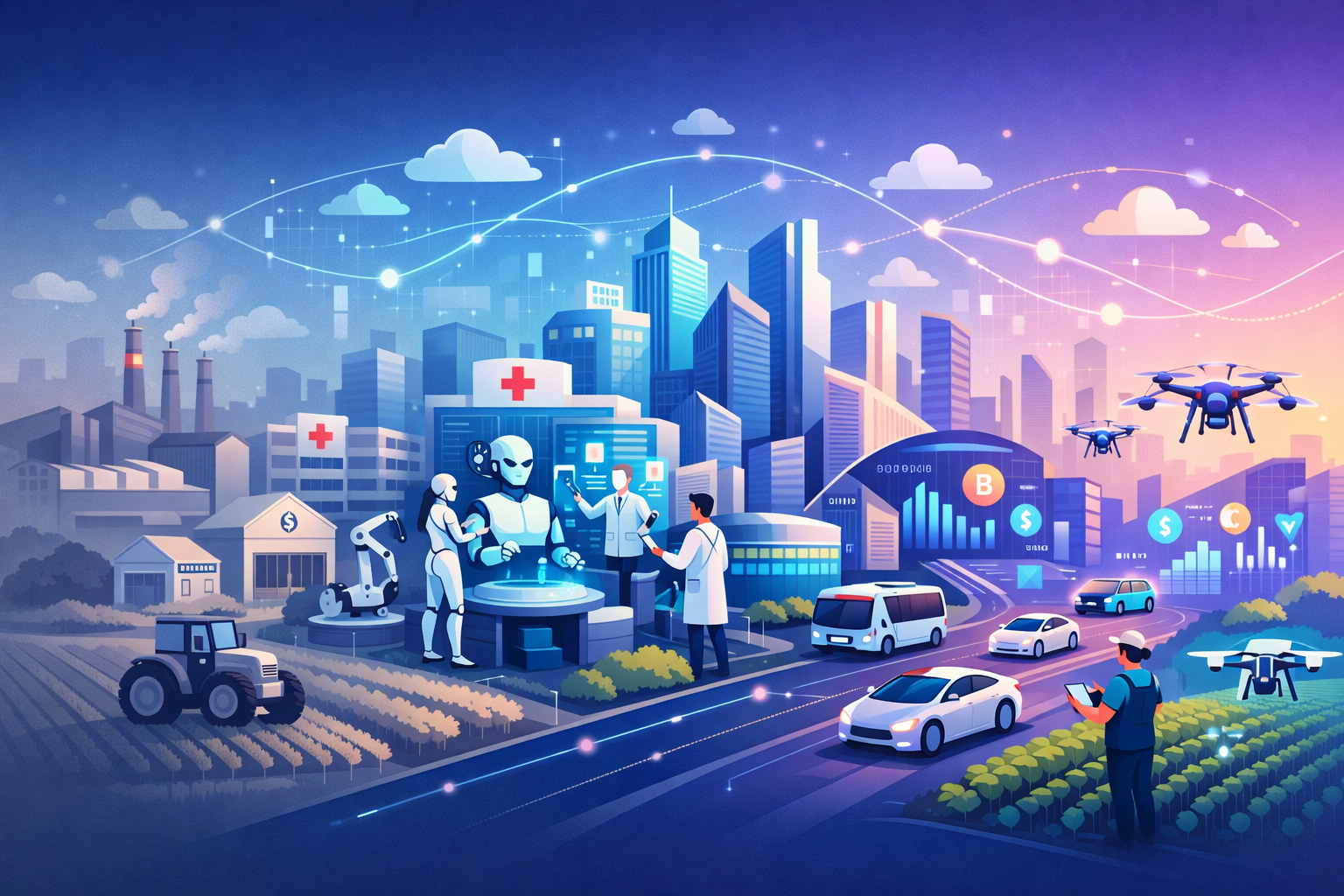
Technology is no longer evolving in predictable cycles — it is advancing in disruptive waves that are redefining entire industries in real time. From artificial intelligence reshaping decision-making to connected devices transforming global supply chains, emerging technologies are rapidly moving from experimental innovation to operational necessity.
Businesses today are not simply adopting new tools; they are rebuilding how value is created, delivered, and scaled. The organizations gaining competitive advantage are those recognizing a fundamental shift: technology is no longer a support function — it is the business itself. Understanding these transformative forces is now essential for leaders navigating an increasingly digital-first economy.
Artificial Intelligence & Machine Learning
Artificial Intelligence (AI) and Machine Learning (ML) have evolved from experimental technologies into core drivers of enterprise decision-making. These systems analyze massive datasets, identify patterns, and automate complex processes that once depended entirely on human judgment. Today, AI is not only improving efficiency but redefining how organizations operate and compete.
Key applications across industries include:
- Healthcare: Predictive diagnostics enabling earlier disease detection and improved treatment planning
- Finance: Real-time fraud detection and risk assessment
- Retail: Personalized product recommendations and customer experience optimization
Business benefits of AI and ML:
- Faster data-driven decision-making
- Reduced operational costs
- Improved productivity and efficiency
- Enhanced customer engagement
Increasingly, AI is shifting from pure automation toward human–machine collaboration, augmenting professional expertise rather than replacing it.
Internet of Things (IoT) and Smart Connectivity
The Internet of Things (IoT) connects physical devices through real-time data exchange, transforming traditional operations into intelligent ecosystems. By embedding sensors into infrastructure and equipment, organizations gain continuous visibility into performance and usage patterns.
Common IoT implementations include:
- Smart factories powered by Industry 4.0 principles
- Connected homes and smart city infrastructure
- Real-time supply chain and logistics monitoring
Industrial transformation enabled by IoT:
- Predictive maintenance that minimizes downtime
- Improved operational efficiency
- Energy optimization and sustainability tracking
- Faster response to operational disruptions
IoT ultimately enables businesses to move from reactive decision-making to proactive, insight-driven operations.
Blockchain Technology Beyond Cryptocurrency
Blockchain technology offers a decentralized and transparent system for recording transactions securely across distributed networks. While widely associated with cryptocurrency, its enterprise applications extend far beyond digital assets.
Key blockchain use cases include:
- Supply chain tracking and product authenticity verification
- Secure digital payments and cross-border transactions
- Protection and sharing of healthcare records
- Smart contracts that automate agreements
Core advantages of blockchain adoption:
- Increased transparency
- Enhanced data security
- Reduced fraud risks
- Improved stakeholder trust
As digital transactions expand globally, blockchain is becoming a critical infrastructure for trust-based digital ecosystems.
Cloud Computing & Edge Computing
Cloud computing has become the backbone of digital transformation by providing scalable, on-demand computing resources. Organizations can deploy services globally while enabling seamless collaboration across distributed teams.
Key advantages of cloud platforms:
- Scalable infrastructure without heavy capital investment
- Remote work and global collaboration support
- Faster deployment of applications and services
Edge computing complements cloud systems by processing data closer to its source.
Industry applications powered by cloud and edge computing:
- Streaming platforms delivering real-time content
- Autonomous vehicles and intelligent systems
- Real-time analytics and operational monitoring
Together, these technologies empower startups and enterprises to innovate faster while maintaining operational agility.
Automation, Robotics & Advanced Manufacturing
Automation and robotics are transforming production environments by introducing intelligent systems capable of performing repetitive and precision-based tasks. Industries increasingly rely on robotics to improve efficiency while maintaining human oversight.
Major areas of adoption include:
- Manufacturing assembly lines
- Warehouse logistics and fulfillment centers
- Healthcare procedures and laboratory automation
Benefits of automation and advanced manufacturing:
- Increased productivity and output consistency
- Improved workplace safety
- Reduced operational errors
- High-precision manufacturing capabilities
Collaborative robots, or cobots, represent a new model where humans and machines work together to achieve higher-value outcomes.
Emerging Technologies on the Horizon
Beyond today’s dominant innovations, several emerging technologies are poised to influence the next wave of industrial transformation.
Technologies shaping the future include:
- Augmented Reality (AR) & Virtual Reality (VR): Immersive training and customer experiences
- Quantum computing: Advanced problem-solving and complex simulations
- 5G connectivity: Ultra-fast communication enabling smart infrastructure
- Green technologies: Sustainable innovation and reduced environmental impact
These advancements indicate a future where digital transformation and sustainability evolve simultaneously.
Challenges and Ethical Considerations
Despite their benefits, emerging technologies introduce complex ethical and operational challenges that organizations must address responsibly.
Key concerns include:
- Data privacy and responsible data usage
- Workforce displacement and reskilling needs
- Expanding cybersecurity threats
- Regulatory and governance requirements
Responsible innovation, transparent policies, and ethical deployment strategies will determine long-term technological success.
The Innovation Imperative
Emerging technologies are fundamentally reshaping how industries compete, innovate, and deliver value. Businesses are no longer evaluating whether to adopt technology but how quickly they can integrate it strategically.
Organizations that succeed share common priorities:
- Continuous innovation and adaptability
- Investment in digital skills and infrastructure
- Responsible and ethical technology adoption
- Long-term strategic thinking
As technological disruption accelerates, one reality stands out: organizations that embrace innovation today will define tomorrow’s global economy.
The Innovation Imperative
Emerging technologies are fundamentally reshaping how industries compete, deliver value, and plan for the future. Organizations that embrace continuous technological adaptation are better positioned to navigate disruption and unlock new growth opportunities. Success in today’s economy increasingly depends on agility, digital readiness, and responsible innovation. As transformation accelerates across sectors, one defining truth emerges: organizations that invest in innovation today will play a decisive role in shaping tomorrow’s global economy.
Innovation
Top Innovation Trends Shaping the Future of Business in 2026
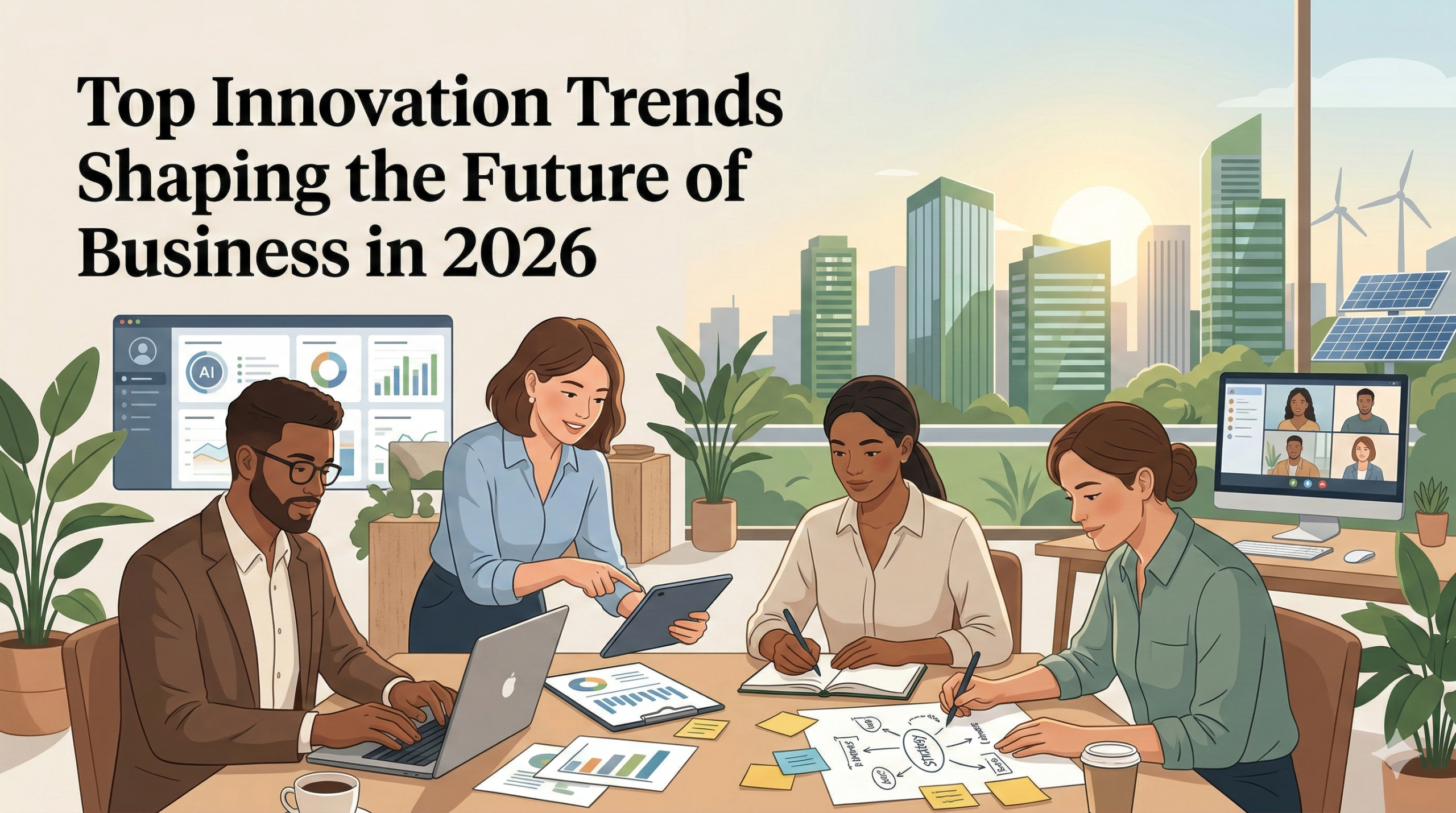
Innovation isn’t slowing down — it’s accelerating at a pace that’s rewriting the rules of business as we know them.
In 2026, companies aren’t just competing on products or price anymore; they’re competing on how fast they adapt, automate, and reinvent themselves. From AI-powered decision-making to sustainable tech breakthroughs and hyper-digital customer experiences, innovation has become the ultimate growth engine.
The businesses leading tomorrow aren’t waiting for change — they’re building it. In this article, we dive into the top innovation trends shaping the future of business in 2026, and why understanding them today could be the difference between leading your industry or struggling to keep up.
Innovation Trend #1 – Artificial Intelligence Becoming a Core Business Partner
Artificial Intelligence (AI) has moved far beyond simple automation. In 2026, AI functions as a strategic business partner rather than just a technical tool. Companies are using AI-powered analytics to forecast market trends, optimize pricing strategies, and improve decision-making in real time.
Customer service chatbots now deliver personalized support instantly, while marketing teams rely on AI to analyze consumer behavior and predict purchasing patterns. Supply chains are becoming smarter through predictive maintenance and demand forecasting, reducing delays and operational costs.
Businesses that successfully integrate AI into daily operations are gaining speed, accuracy, and efficiency — turning data into actionable insights that drive smarter growth.
Innovation Trend #2 – Hyperautomation and Smart Workflows
Hyperautomation is redefining productivity across industries. By combining artificial intelligence, robotic process automation (RPA), and cloud technologies, businesses are automating not only repetitive tasks but also complex workflows.
Routine operations such as invoice processing, employee onboarding, and data management can now run with minimal human intervention. This shift allows employees to focus on strategic thinking, creativity, and innovation rather than manual processes.
The result is faster execution, fewer operational errors, and significant cost savings. In a competitive marketplace, streamlined workflows give companies the agility needed to respond quickly to changing customer demands and market conditions.
Innovation Trend #3 – Sustainable and Green Innovation
Sustainability has evolved from a corporate responsibility initiative into a major innovation driver. Businesses in 2026 are investing heavily in green technologies, renewable energy solutions, and sustainable production methods.
Consumers increasingly favor brands that demonstrate environmental accountability, pushing organizations to adopt eco-friendly practices. Circular economy models — where products are reused, recycled, or repurposed — are gaining momentum across manufacturing and retail sectors.
Sustainable innovation not only reduces environmental impact but also strengthens brand reputation and long-term profitability. Companies that align innovation with sustainability are building trust while preparing for stricter global regulations and evolving consumer expectations.
Innovation Trend #4 – Digital Customer Experience Transformation
Customer expectations have reached an all-time high, and digital experience now defines brand loyalty. Businesses are leveraging advanced data analytics to deliver personalized interactions across websites, mobile apps, and social platforms.
Omnichannel strategies ensure seamless transitions between online and offline experiences, allowing customers to interact with brands anytime and anywhere. Emerging technologies such as augmented reality (AR) and immersive digital environments are transforming how customers explore products and services.
In 2026, innovation is customer-centric. Companies that prioritize convenience, personalization, and engagement are turning user experience into a powerful competitive advantage.
Innovation Trend #5 – Remote Collaboration and Future Work Technologies
The workplace has permanently evolved. Hybrid and remote work models are now standard, supported by advanced collaboration tools and cloud-based platforms. Innovation is enabling teams to work efficiently across locations, time zones, and cultures.
Virtual workspaces, AI-assisted project management tools, and real-time communication platforms allow organizations to access global talent without geographical limitations. This flexibility encourages creativity, faster problem-solving, and diverse perspectives.
Businesses that embrace future-of-work technologies are not only improving productivity but also attracting top talent seeking flexibility and modern work environments.
Innovation Trend #6 – Data-Driven Decision Making
Data has become one of the most valuable business assets. In 2026, successful organizations rely heavily on real-time analytics to guide strategic decisions. From customer insights to operational performance metrics, data empowers leaders to act with confidence rather than assumption.
Advanced analytics tools help companies identify opportunities, minimize risks, and optimize performance across departments. However, with increased data usage comes the need for stronger cybersecurity and governance frameworks.
Organizations that effectively harness data gain a measurable advantage, enabling faster responses to market shifts and more informed long-term planning.
Innovate or Fall Behind
The future of business belongs to organizations willing to evolve. Innovation in 2026 is no longer confined to technology departments — it shapes leadership, customer experience, sustainability, and workplace culture. Companies that embrace AI, automation, digital transformation, and data-driven strategies position themselves for lasting success.
As industries continue to change at unprecedented speed, innovation becomes more than a growth strategy; it becomes a survival mindset. Businesses that actively adapt, experiment, and innovate today will define the markets of tomorrow. The question is no longer whether innovation matters — but how quickly companies are ready to act.
-

 Featured1 year ago
Featured1 year ago20 Entrepreneurs to Watch Closeout 2024
-

 Innovation2 years ago
Innovation2 years agoInnovators in Social-Emotional Learning: Dr. Myava Clark and Chris Clark Jr.
-

 Music2 years ago
Music2 years agoArtist Deydee Signs $350,000 Contract with Rueda Empire LLC
-

 Latest2 years ago
Latest2 years agoCharles zhang recognized by forbes as #1 on michigan’s 2022 best in state wealth advisor list
-
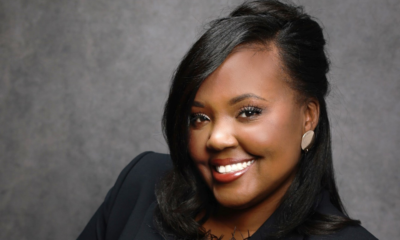
 Uncategorized1 year ago
Uncategorized1 year agoTrailblazer in Business: Alicia Fitts on Building Wealth and Community Through Faith
-
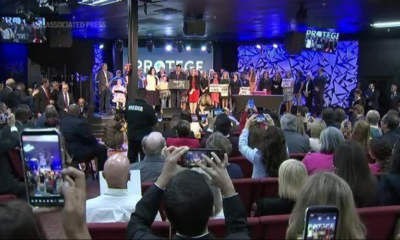
 Latest1 year ago
Latest1 year agoFlorida Gov DeSantis signs 15-week abortion ban | Latest News
-

 Lifestyle2 years ago
Lifestyle2 years agoPhillip Austin brings outlaw country to General Duffy’s stage – The Bulletin
-
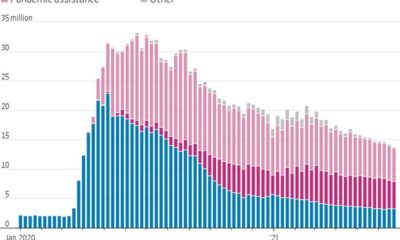
 Small Business1 year ago
Small Business1 year agoSmall Business Labor Shortage – Forbes





